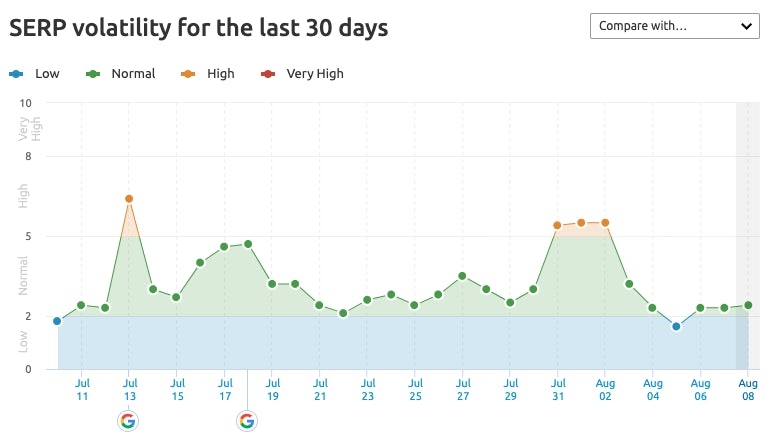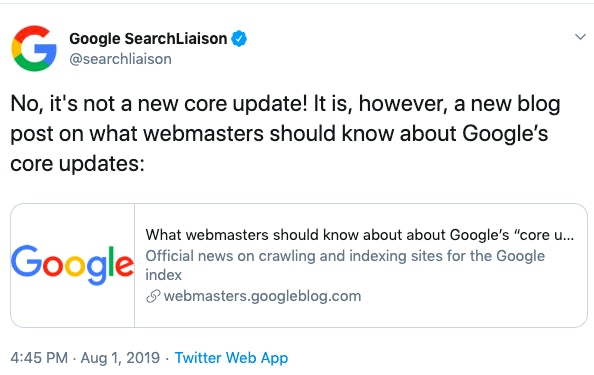July was a relatively quiet month in the world of SEO, aside from several notable changes.
The most widely-discussed industry event was the so-called Maverick Update, which appeared to cause significant ranking and traffic volatility between July 11th and July 18th. There were also a number of insightful articles published on the impact of neural matching and RankBrain, particularly in relation to health sites. Finally, the search industry noticed further SERP volatility on August 1st and many have pointed out that this comes exactly one year after the major ‘Medic update’ in 2018. We will be monitoring the effect of this update in the coming weeks and will report back in next month’s blog post.
July 11th-18th: Maverick Update

SEOs reported major SERP volatility across a number of unrelated industries between July 11th and July 18th, particularly in the US. While Google is yet to comment on this suspected algorithm change, several third-party tools confirm what many have seen on their clients’ websites. Below are images taken from the SEMRush Sensor.
USA

United Kingdom

The update has been given the name ‘Maverick’ in relation to the new trailer for ‘Top Gun: Maverick’, which was released around the same time. Due to the widespread nature of the update, it is difficult to pin down a specific reason for the change. Our recommendation is to continue monitoring your site and producing valuable, highly-relevant content that your audience engages strongly with.
August 1st: Potential Update

Early August saw chatter around another potential Google search ranking algorithm update. Search engine roundtable noted prior signs from the SEO community and within industry tracking tools of an update arising. This was regarded as an unconfirmed update as Google had not pre-announced anything but large fluctuations are occurring across different industries. Interestingly, this was one year on from the August 1st 2018 update impacting many health and medical sites, therefore being dubbed as the “Medic update”.
However, Google has since been keen to react to this on Twitter by squashing any rumours of an unannounced broad core algorithm update, and instead linking towards an interesting blog summarising what webmasters should know about core algorithm updates.
The main points from the webmasters blog include reassessing content for any page that may not be performing as well and optimise accordingly using the E-A-T guidelines to offer the best possible content to your users. This is turn is likely to be content that Google’s algorithms are more likely to reward, particularly if it provides substantial value when compared with other competing pages within the SERPs.

Search Industry Updates

In July, several influential SEOs published some insightful articles on the wider search industry. One such article was published by Roger Montti in Search Engine Journal, titled ‘Google Broad Core Updates And Why Some Health Sites Affected’. The article discussed how Google’s increasing reliance on neural matching and RankBrain has helped it better understand search queries, thereby dramatically changing the SERPs for health-related sites.
To summarise the article, Montti suggests that health topics can be ‘divided between strictly scientific meanings and alternative and so-called natural cures. Thus, if Google better understands that a query requires a scientific response, then it makes sense that sites promoting non-medical alternative solutions will suffer.’
The so-called Medic algorithm update that we saw in August 2018 caused major fluctuations in organic rankings for this very reason. It wasn’t that Google was specifically targeting poor-quality health sites, but rather it was part of Google improving its understanding of what search intent and how best to satisfy it. If Google believes that a query requires a detailed scientific response from a trusted source, for example, then it makes sense that sites promoting non-medical alternative solutions will suffer.
In the same article, Montti asks SEO expert Dr. Pete Meyers why health sites continue to be disproportionately affected by algorithm updates. His response can be broken down into three main points:
- There is a correlation between sites impacted in subsequent core updates and the original update. While we cannot be sure as to which factors are taken into account each time, it seems logical that the factors Google considers in core updates are qualitatively different from those in more routine updates.
- Every core update is imperfect, which means that subsequent updates will attempt to mitigate mistakes and refine the algorithm to best reflect user intent.
- While Google has said that it does not specifically target health sites, it would seem logical that they would pay more attention to websites targeting Your Money or Your Life (YMYL) queries, as the search engine giant is keen to answer these queries accurately. It is therefore possible that ore algorithm updates analyse trust signals more closely in industries where trustworthiness is particularly important.
Have we missed anything out? Let us know in the comments.
Read further algorithmic updates from the team, or contact the team today.





